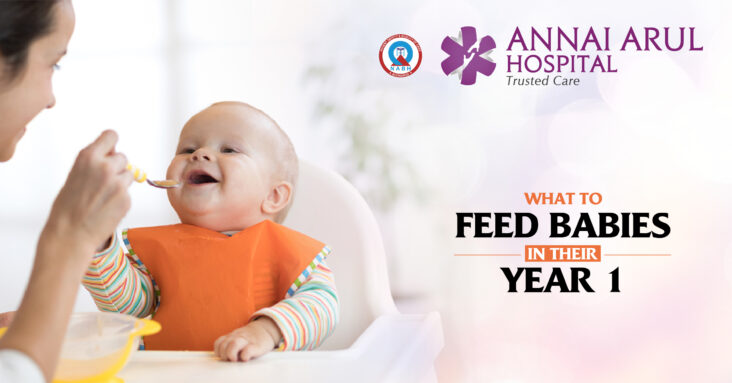WHAT TO FEED BABIES IN THEIR YEAR 1
At year 1 your baby is just learning to eat on his/her own. They can chew the food as well as you can, which means they can eat the same foods as the rest of the family. Solid food including healthy snacks are your child’s source of energy and nutrition.
You can still continue breastfeeding the baby as much as the child wants. Take care to avoid giving the baby junk foods and soft drinks.
Here is a look at the progression of diet for the baby till year 1.
Start solids at 6 months
This is the accepted period for introducing solid foods to the baby. Before innntroducing solids, its mandatory that your baby should be able to sit up (with support), turn the head away and chew the food. He should also have given up the reflex that makes him spit out anything that goes into the mouth.
Add to breast milk
Usually, babies will not eat a lot of solid foods right away. So we should think of solids as something we add to the baby’s diet. It will not be a replacement for breast milk though. We just introduce solids and not change the baby’s diet entirely or eliminate milk. The change should happen gradually.
Why start with rice cereal?
There is no rules as such that you should start your baby on a particular solid food. You can also avoid cereals completely. But, if you feel comfortable with cereals, then start on a single-grain, iron-fortified infant cereal with a neutral flavour. You can mix it with the formula or milk to get a running consistency. Then you can gradually thicken it, so the baby takes to it.
Start on fruits and vegetables
Your baby’s solids can include fruits, vegetables, grains and even pureed meats. Take care to introduce any of these one at a time. This is to observe how the baby reacts to the flavours and if it causes any allergies. The baby may not eat them at first, but keep trying. Use softened or pureed food and put enough on the spoon for the baby to swallow easily. Don’t try to force-feed when the baby refuses to eat, take it slow and your baby will soon start eating solid food.
Cut out milk and honey
According to paediatricians, you should wait till your baby’s first birthday to offer cow’s milk. Since it can not compare to mother’s milk or have the nutritional value of some other formulas. Best not give honey too since it can cause botulism in babies whose immune system cannot fend it off.
Stop when baby stops
Your baby has a way of telling you when its done eating. The baby will swat at the spoon, turn the head away, zip its lips or spit the contents from its mouth, and finally the baby will cry too. Don’t try to force-feed since the baby knows when it’s full. Honouring their instincts will help the baby avoid overeating as they grow older.
Try some finger foods
At about 9 months, the baby will be able to reach for and pick-up small pieces of table food to eat. Some great finger foods for the baby include ripe banana pieces, cooked carrots, cottage cheese, cooked pasta, cereals and scrambled eggs. Avoid placing hard candy, chips, raw vegetables, dry fruits, hard cheese and sausages etc. near the child.
======================


